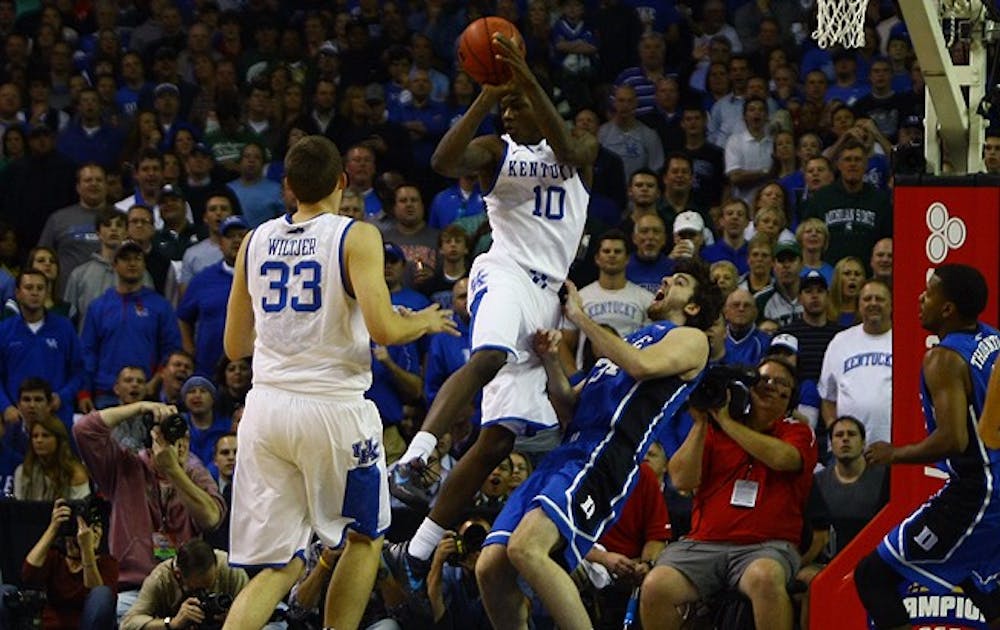In the frenzy surrounding the NBA’s adoption of anti-flopping rules, here’s the question nobody asked until Tuesday night: How would it affect Duke?
But Kentucky head coach John Calipari finally made the connection between the NBA’s new rule and the school most known for its basketball acting during halftime of Duke’s win over the Wildcats.
“They’re flopping all over the place,” he said. “In the NBA, they’d all be suspended.”
Calipari tried to distance himself from the comments after the game when he was asked about them by a Chronicle reporter.
“It was a joke,” Calipari said. “You guys at Duke can take a joke, right? Jeez.”
Joke or not, fairly or unfairly, Duke players have been stuck with the reputation as floppers for as long as Mike Krzyzewski has been on the sidelines at Cameron Indoor Stadium. But Krzyzewski said Tuesday that a flop and a foul are not the same thing.
“I think we took some amazing charges and probably could have taken a couple more,” he said. “There’s a difference between a charge and a flop. A flop means you don’t take any contact. I would hope that anybody who watches the game thinks our kids really played outstanding defense and were there to take charges.”
Still, as anyone who follows college basketball knows, Duke players have become the poster boys for flopping. Miami Heat forward Shane Battier, who has openly criticized the NBA’s new rule, is often the first associated with the label.
Others, such as J.J. Redick and Greg Paulus, have also been labeled as floppers. Battier, Redick and Paulus declined comment for the story.
“Taking a charge, in general, is one of the most unselfish, good plays that a player can make,” Duke associate head coach Steve Wojciechowski said. “It’s been a staple for our program since well before I ever got here.”
It was pivotal in Duke’s defensive game plan Tuesday, when the Blue Devils drew four charges in the first half prior to Calipari’s comments. After watching the Wildcats on film, the coaching staff felt taking charges would be critical to their strategy, Wojciechowski said.
Josh Hairston, Seth Curry, Tyler Thornton and Rasheed Sulaimon clearly got the message, all planting in the face of contact and hitting the deck for charge calls in the first half against Kentucky. Maybe the Wildcats, or the referees, got Calipari’s message at halftime—they were not called for an offensive foul in the final 20 minutes.
But the Blue Devils do not take kindly to the suggestions that their charges are not legitimate.
“Anytime somebody says that, whether it’s a coach or fan, it shows an obvious lack of respect for what a good play it is,” Wojciechowski said. “We don’t make any apologies for it.”
None of the current Blue Devils compare to Battier, however, who Wojciechowski said is the best he has ever seen at taking charges. He identified two talents that made Battier the best: the intelligence to be in the right place at the right time and the willingness to put his body on the line.
In an interview before the season, Duke senior forward Ryan Kelly said he tries to model his game after Battier’s more than anybody else’s. Kelly, who showed his commitment to charges, taking one in a fastbreak drill during the team’s open practice at the beginning of the year, also brushed off the bum flop rap.
“You get hit in the chest and tell me how it feels. It doesn’t feel good when you get bowled over,” Kelly said in October. “The block-charge is one of the toughest calls to make in basketball, but I’m going to keep taking them if it helps our team win.”
The difficulty of the call is at the core of the issue in both the NBA and NCAA. The NBA defines flopping as a “physical act that appears to have been intended to cause the referees to call a foul on another player,” according to an NBA official release. Flops are physical reactions inconsistent with what would be expected from contact on a play.
There are 18 Blue Devils in the NBA, not including the league’s rising comissioner Adam Silver.
In an effort to clarify the distinction between blocks and charges, the NCAA implemented a restricted arc beneath the hoop where defensive players cannot draw a charge, except in the case of anything flagrant or excessive. The additional rule came after two seasons in which the NCAA had implemented the restricted zone without putting the physical semicircle on the floor.
The NCAA’s distinction of blocks and charges requires referees to make a split-second decision between who is responsible for the contact, depending on if the defender was already in the dribbler’s path or if the dribbler “passes an opponent sufficently to have head and shoulders beyond the front of the opponent’s torso.”
Easy, right?
Regardless how difficult the call is to make, the Blue Devils just want people to stop talking about them flopping.
“Instead of coaches and fans commenting about it in a negative way, you think people would appreciate and recognize what a good play it is,” Wojciechowski said.
And Krzyzewski coyly quipped in his press conference after the Kentucky game that no matter what people say about Duke, this is not the NBA.
“[The players] don’t make any money, so they can’t be fined,” he said.
Get The Chronicle straight to your inbox
Signup for our weekly newsletter. Cancel at any time.

